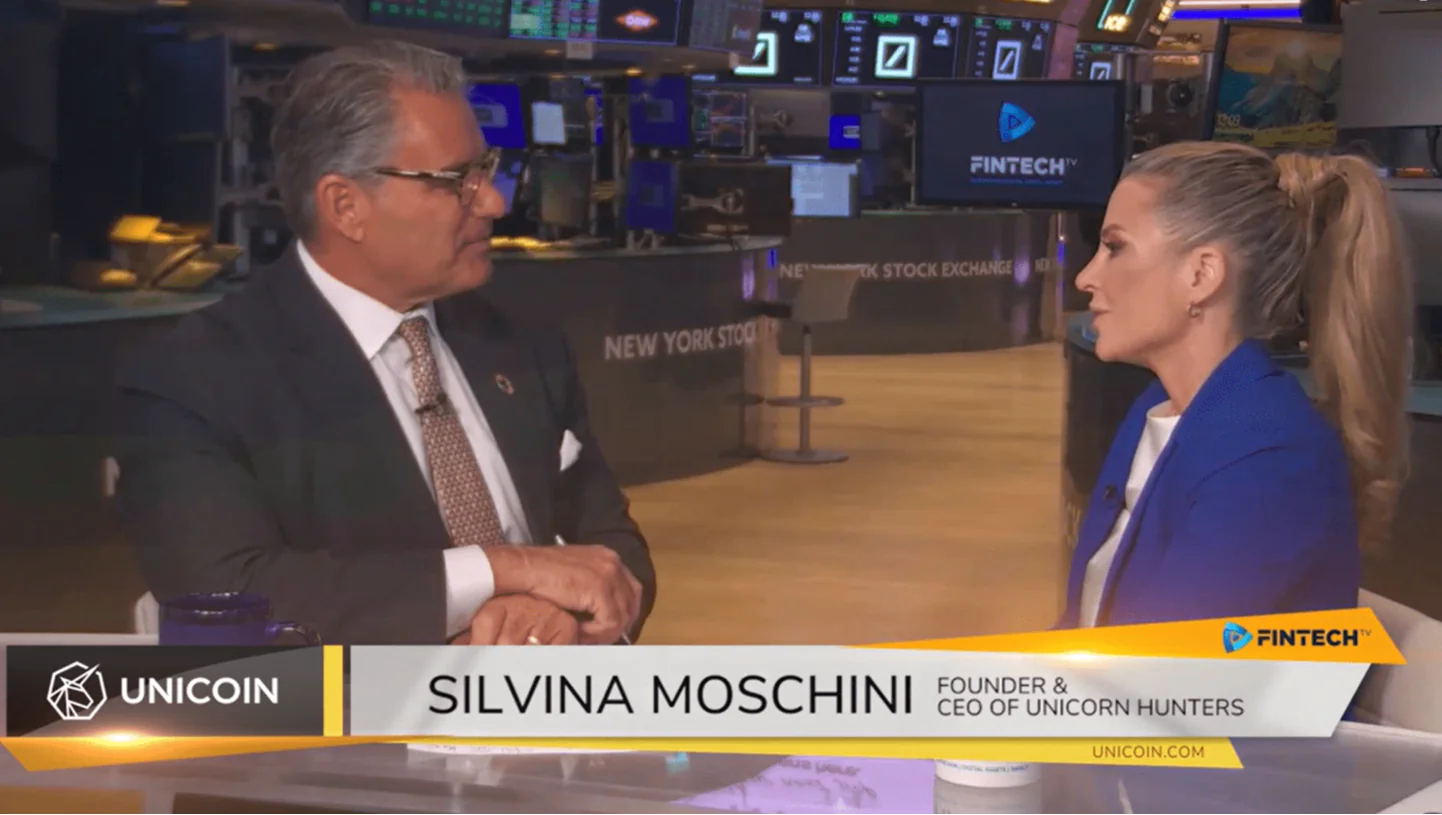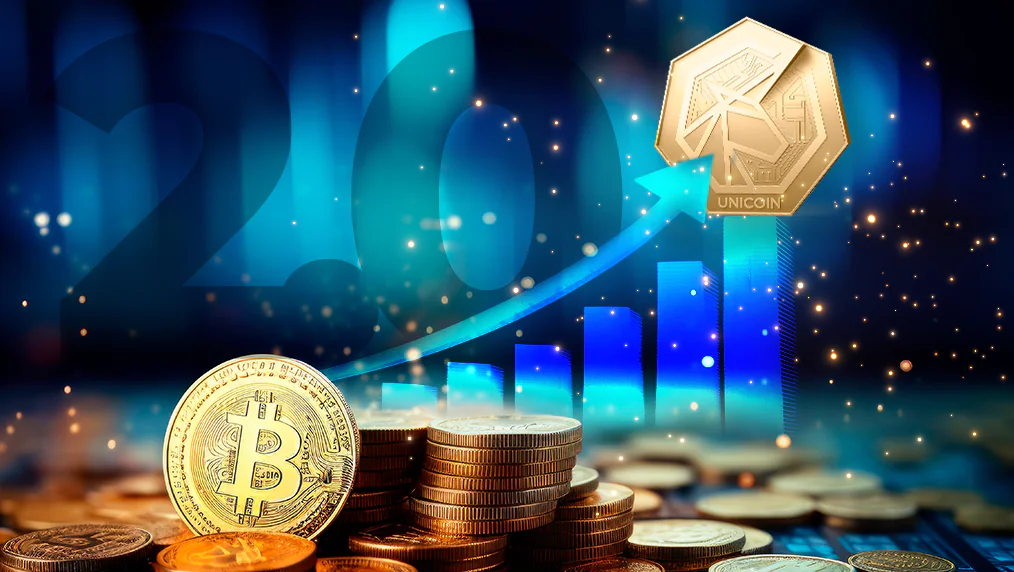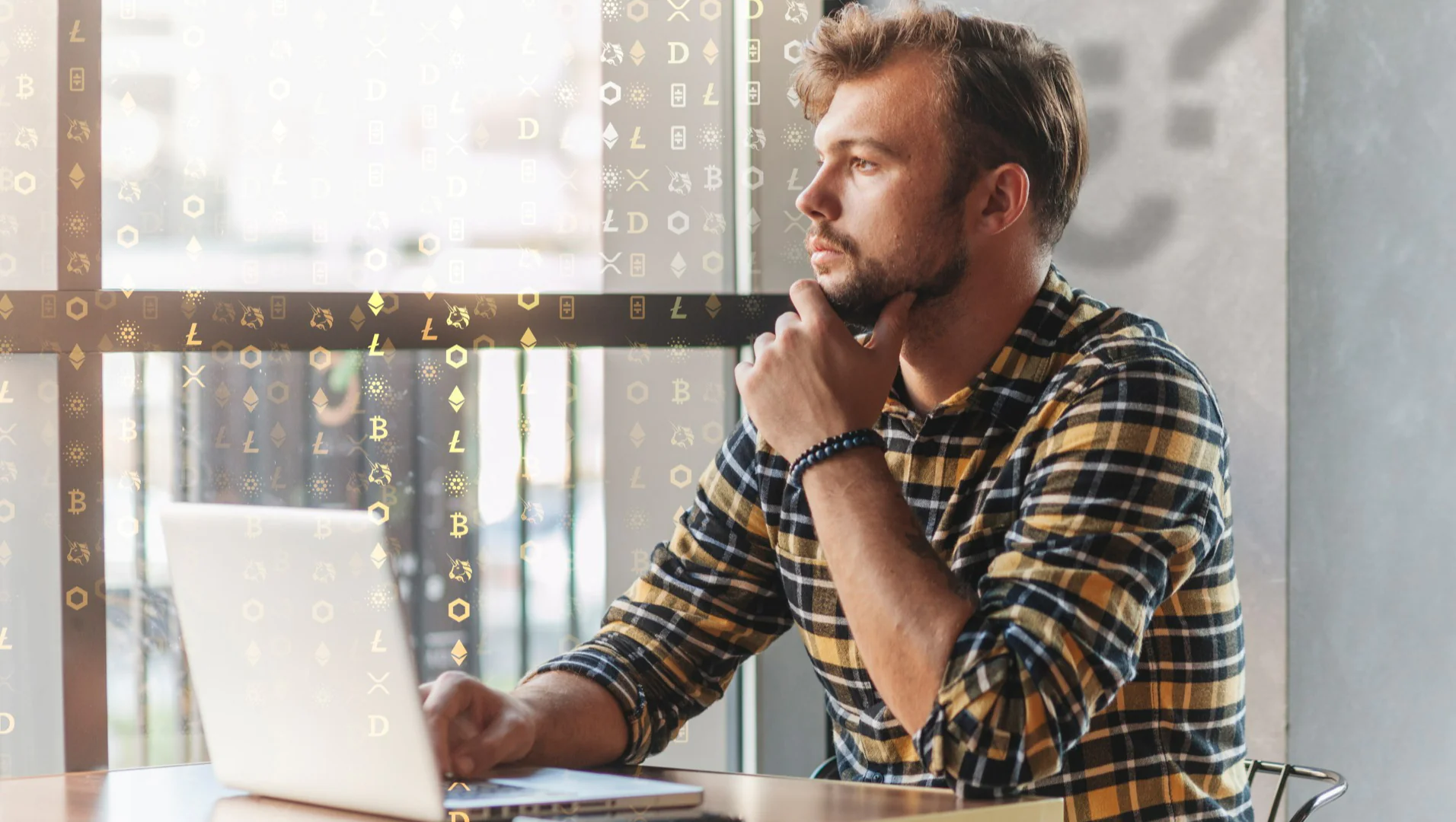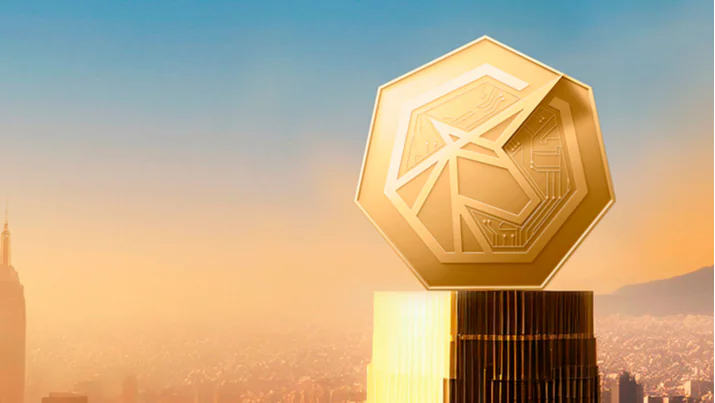Fearless in Finance: Silvina Moschini's Ignites a Financial Revolution at the NYSE for Women's Economic Independence
 8 min read
8 min read- March 7, 2024
- by UH News
Silvina Moschini, the CEO of Unicorn Hunters and founder of Unicoin, took center stage at the iconic New York Stock Exchange (NYSE), where she had an inspiring talk with Vince Molinari, host of FintechTV, that delved deep into the importance of encouraging women to be economically independent.
Molinari kicks off the conversation by probing Moschini on why women's financial autonomy is so crucial to her. You do so much around the world for women's empowerment, gender equality, and financial inclusion. We have the'Fearless Girl' outside the Exchange. So, how fitting to start off that way. Tell me why it's so important for you to bring women globally into new economic opportunities?
Well, as a starter, women are humans, and as humans, we deserve the same opportunities as men. But sadly we didn't for many years. I understood that from someone who was extremely special to me. My dad died when I was a little girl. He told me that I could be a princess, but if I wanted to be a princess I needed to be one that built her own castles.
Because independence always starts with financial independence. I think that being here today and having the opportunity to talk to you about women, about power, about money, shows how we are moving from the old narrative into actually getting things done, getting women comfortable talking and making money, and embracing the opportunities that the ability to create companies and be naturally leading their financial future can bring.
I love the great words of wisdom from your dad to build your own castle as you continue to help others build their castles. What's the best message that you can give to women who need to know how to go about this? What are the first steps?
I think that the most important thing is to see it inside your heart if you have it to become an entrepreneur. Because this is a very tough journey. It's a miraculous journey in which you have to reinvent yourself a hundred times and you have to develop thicker skin because a lot of these things will go wrong. A lot of people will tell you many times that you don't have what it takes, that you can just stay at home.
So what I can tell them is if you have it inside, build big. Build a big company that has a big impact, and use the opportunity that the crisis brings, allowing entrepreneurs in general and women entrepreneurs to build with little money, to leverage from the on-demand economy, to leverage from the fact that today is more valued to have a camera and you can create content to the world. And also just see that the biggest limitations we always have are those that live in our heads.
There are no differences that should separate a person, man or woman from their dreams and becoming an entrepreneur that can create wealth. They can create impact, they can solve real-world problems and it's as challenging as it's magic.
What a great and perfectly timed message. Let's talk about the extension of that. When we talk about democratizing access to capital, what does that really mean to you and your platform?
Access to capital… That's one of the things that keeps me up at night because as a woman entrepreneur, I went through that. Only 2% of the VC Capital goes to female companies, and diverse founders who have it extremely challenging to get the capital.
So for us what it means is connecting the talent with the opportunities and solving the issue, not only for the entrepreneur but also for those persons that are in the audience that want to invest in this company. We did it by creating a show called'Unicorn Hunters', that connects the dots between the entrepreneurs that are presenting and pitching their companies to those people that can actually provide the funding and invest in them to make it happen. In this role of course, we encounter founders from all over the world, from all different walks of life, and from different ages who have great companies and just need to have the backers that make their companies happen financially, and then the rest is history.
Business ideas that never get heard because they don't have access. So by bringing that visibility and awareness, they're letting their voices and their ideas be heard.
Absolutely. They make them visible and it makes them transparent. For us, transparency and accountability are a pillar and we are basically connecting the dots. There are thousands of hubs that accelerate entrepreneurs in remote places from Chile to Doha. What we are building here it's a network. It's a platform that will work with innovators. Connecting these innovators brings them together and creates a funnel. So we connect entrepreneurs with access to capital, with access to talent globally, and with access to market opportunities, and we do it this by leveraging the Job Acts, as you said, allowing them to advertise and sell part to the general audience in a show in which we just present the talent to the world and let the people do their magic.
The opportunities are truly global when you talk about Doha to back to the United States to Mumbai, right? Thematically. It's the same message that you never know where the next best idea or the next entrepreneur is sitting with a revolutionary company. So bringing that visibility is really extraordinary.
Yes, and it's one of the beautiful things that happen in the show. When we started in the pandemic we were out there at the CBS Television City in LA with a dream team. We have executive producers that built'The Masked Singer','The Apprentice','Deal or No Deal' and we were sitting there as an entrepreneur saying like, hey, we raise money for ourselves using the Jobs Act. What about if we take this to the next level and build a platform that will allow other entrepreneurs to do the same? And we found out that it was doable. We got the likes of Steve Wozniak, the emblematic founder of Apple, Rosie Rios, a former treasurer of the United States, and Lance Bass from NSYNC.
It was an amazing opportunity to meet founders from India, UK, Denmark, Mexico, and Chile and connect with them through the show. Not only with people who became their investors but also with people who said I want to represent your company. I want to take your company to my market. I want to help you to grow. Suddenly this crowdfinancing allows many people to have skin in the game for the success of these entrepreneurs.
So it's not only about the money. Money of course can do a lot of things, but cannot buy you happiness or necessarily complete success. It enables you to connect with the people who can help you to open the doors to have their endorsement that can bring a contract. Entrepreneurs sometimes need advisors. So our show is a magic connector of dots. At the end of the day, it's just to facilitate access to capital for entrepreneurs, but also giving people who before never had the opportunity to invest access to the same opportunities that only rich people have.
We talk about the democratization of access to capital for companies to grow but it's the other side as well: the access to wealth creation for individuals who didn't have that access before. That is so powerful.
Yes, absolutely, because access to capital for entrepreneurs is fundamental to making their companies. If there is no money there is no company. So we all know that this is the blood of our project. Also, you know how important it is to have the backing that can help the company scale… When we think about how people make money, maybe they think about going to Las Vegas or scratching a card. Because investment was not accessible to the masses if you want to invest in a start-up you have to be a wealthy uncle who has a nephew or niece who is starting up and has this ability because of the system. the traditional venture capitalists ecosystem kept them very tied to the heart and it was not open for regular people or smaller tickets.
By creating this platform, we allow these people in the audience who have some money, perhaps they don't have hundreds of thousands of dollars to be a traditional angel investors, to put their bet and to benefit. Imagine first investors of over the world who invested five thousand dollars ended up with a check for 25 million when over IPO.
You're a founder of Unicoin. Where does that come from? How did that fit in?
We saw that we could create a coin that could address the issues of traditional cryptocurrency. We saw this as a way in which we can allow investors to have a vehicle in which when they said well, I like this company and I like this other company, but I don't have enough resources. So I don't feel like I want to invest separately in one company or the other but I want to feel that I'm hedging my risk.
So there's it comes Unicoin as this vehicle that is backed by real-world assets including equity stakes of many companies that go through the show ecosystem, companies that we are scouting and bringing on board and investing in, and also by real estate. We have over 1.4 billion dollars in real estate assets that we acquire using unicoins that were signed to be part of our portfolio.
We are creating the next-generation cryptocurrency that addresses the issues of traditional volatility, lack of transparency, and the Wild West of first-generation crypto and it helps people to invest easily because crypto is a huge democratizer of investment opportunities because it's easy. So people can invest in Unicoin and have the best of this traditional financial system and the best of the blockchain technology.
Well, absolutely fascinating, Silvina have to have you back again soon. There's so much to talk about and extend on. Welcome again today the first of many conversations that I hope to have with you.
Thank you so much. I'm so thrilled to have the opportunity to be here like the'Fearless Girl' that I have inside of me. We can always say like,'Yes, it can be done'. It has to take passion. It has to take determination. But, of course, it also has to take the knowledge and the certainty that we have everything inside of us to make things happen.
Related News

Defy the 70% Failure Rate: 5 Game-Changing Habits of Successful Billion-Dollar Startup Founders
How do successful founders overcome the 70% startup failure rate? Discover the strategies that help founders overcome challenges and achieve unicorn status.
- October 11, 2024
- 2 min read

Halving is Coming: Why Bitcoin is Likely to Lose its Crypto Market Dominance
The market share of the first cryptocurrency could shrink in the face of the emergence of more transparent and regulated alternatives.
- March 29, 2024
- 1 min read

The Decline of Non-Coiners is Paving Paths for Potential Users
By seeing how digital assets can complement their financial plan, the vocal minority that exists and declares the end of cryptoassets may be incorporated into the ecosystem.
- March 27, 2024
- 1 min read

Unicoin Launches Its Primary Offering on U.S. Regulated INX.One Trading Platform
Backed by Real World Assets, Unicoin Security Token is Now Officially Available on the INX Trading Platform.
- March 19, 2024
- 5 min read
